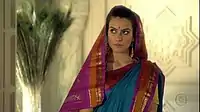| Caminho das Índias | |
|---|---|
 | |
| Also known as | India: A Love Story |
| Genre | Telenovela |
| Created by | Glória Perez |
| Written by |
|
| Directed by | Marcos Schechtman |
| Starring | |
| Theme music composer | Vishal Bhardwaj |
| Opening theme | "Beedi Jalaile" by Sunidhi Chauhan |
| Country of origin | Brazil |
| Original languages | Portuguese Hindi |
| No. of seasons | 1 |
| No. of episodes |
|
| Production | |
| Production locations | Rio de Janeiro, Brazil New Delhi, India |
| Camera setup | Multiple-camera setup |
| Running time | 50–80 Minutes |
| Original release | |
| Network | TV Globo |
| Release | 19 January – 11 September 2009 |
Caminho das Índias (lit: Path to the Indies; English title: India: A Love Story)[1] is a Brazilian primetime telenovela produced and broadcast by TV Globo from 19 January to 11 September 2009, with 203 episodes.
Written by Glória Perez, directed by Marcos Schechtman. Starring Juliana Paes, Rodrigo Lombardi, Letícia Sabatella, Tânia Khallil, Débora Bloch, Alexandre Borges and Bruno Gagliasso.
The plot examines the differences in beliefs and values of the Eastern and Western world. Shot on location in India and Rio de Janeiro, it was Globo's first winning telenovela at the International Emmy Awards.
Overview
The title can be interpreted in two ways: it is Portuguese for "Route to the Indies" (literally) or "India's Way" (figuratively). The story is set during India's transition into a modern democracy, mostly in the period of the 1990s to 2000s, with many prominent flashbacks to the 1950s and 1970s. The story is equally divided between continents, from Rio de Janeiro, Brazil, to Rajasthan, India, with some scenes in Dubai. Themes include love, reason, sanity, insanity, and tradition versus modernity. The story highlights the contrasts of values and belief systems in the West and the East, told through families, their friends, and the complex mesh of relationships which connect them.
Plot

One of the main plot points is a forbidden love between castes. Maya, a charming call-centre employee in Rajasthan, comes from the Vaishya trader caste. While her parents try to arrange a marriage for her, she falls in love with Bahuan, which she declares to her parents. She does not understand Bahuan's misgivings until learning that he is the orphaned son of Dalit (untouchable) servants who were burned at the stake for accidentally touching their master's shadow. They plan a future together while her parents arrange a marriage to Raj Ananda, and Bahuan works toward his career, eventually becoming a partner in a Brazilian company.
Meanwhile, Raj falls in love with Brazilian Duda, who initially fights for Raj's affections but the cultural conflicts exhaust and disillusion her, and she turns away from Raj for a new love. Ravi then falls in love with a Brazilian woman, Camilla. As she tries to adapt to Hindu culture, she provokes conflict in the Ananda family of tradespeople, as Raj's younger sister Shanti aspires to become educated and eschews the traditional roles for women favoured by her mother. Ravi and Camilla eventually marry.
Production
Locations
Artistic and general director Marcos Schechtman and director Fred Mayrink traveled to India to write the telenovela's first scenes, which began filming on 1 October 2008 in the cities of Jaipur and Agra. In addition to 40 people from the Brazilian team, the telenovela had partnered with a local producer.[2] The modern architecture of Dubai, in the United Arab Emirates, also served as filming locations for the show at the end of October.
Sets and art direction
In order to recreate the environment for the story, three-city sets were constructed at Projac in Rio de Janeiro, totalling 11,500 square metres (123,785 sq ft). One of these sets imitates the typical architecture of the Lapa neighborhood in Rio de Janeiro, Brazil, while the other two attempt to recreate features of the Indian state of Rajasthan.


Using the cities of Jaipur, Jodhpur and Mumbai as references, the art director built 42 shops and a temple of Shiva, in addition to the street façade for a movie theater, and terracota-colored households of the four main Indian families of the story. One of the margins of the Ganges was also reproduced, through an artificial lake built near the entrance of the studio complex.
The art production team, led by Mario Monteiro, attempted to reproduce an Indian universe on camera. The Indian core of the telenovela received a very colorful ambiance, with Hindi inscriptions, in comparison to the clean aesthetics of the Brazilian scenarios. The sets were dressed with Indian items which were purchased or reproduced, and vehicles used in India were built by the team to fill the street of the artificial city.
The wardrobe was also carefully studied by Emilia Duncan. Women's traditional clothes, such as the sari were recreated, although with a bit of poetic license, thus bringing some clothing usually used in rituals for the everyday wearing.
Cast
| Actor | Character |
|---|---|
| Juliana Paes | Maya Meetha |
| Rodrigo Lombardi | Raj Ananda |
| Letícia Sabatella | Yvone Oliveira Magalhães |
| Tony Ramos | Opash Ananda |
| Alexandre Borges | Raul Cadore |
| Débora Bloch | Sílvia Cadore |
| Tânia Khallil | Maria Eduarda de Moraes (a.k.a. Duda) |
| Márcio Garcia | Bahuan Sundrani |
| Bruno Gagliasso | Tarso Cadore |
| Marjorie Estiano | Tônia Cavinato |
| Humberto Martins | Ramiro Cadore |
| Christiane Torloni | Melissa Cadore |
| Caco Ciocler | Murilo Cavinato |
| Dira Paes | Norma Cristina Almeida (a.k.a. Norminha) |
| Anderson Müller | Abel Almeida |
| Isis Valverde | Camila Motta Goulart Ananda |
| Caio Blat | Ravi Ananda |
| Cléo Pires | Surya Ananda |
| Thaila Ayala | Shivani Mugdaliar Sundrani |
| Odilon Wagner | Michael Brown Johnson (a.k.a. Maike, Eric Brown) |
| Totia Meirelles | Dr. Aída Motta |
| Antônio Calloni | César Gallo Goulart |
| Ana Beatriz Nogueira | Ilana Gallo Goulart |
| André Gonçalves | Mutineja Gopal (a.k.a. Gopal) |
| Betty Gofman | Dayse |
| Neuza Borges | Iracema (a.k.a. Cema) |
| Danton Mello | Amithab Ananda |
| Juliana Alves | Suellen |
| André Arteche | Indra |
| Maria Maya | Inês Cadore |
| Júlia Almeida | Léa Motta Goulart (a.k.a. Leinha) |
| Ricardo Tozzi | Komal Meetha |
| Paula Pereira | Durga |
| Rosane Gofman | Walkíria (a.k.a. Wal) |
| Victor Fasano | Dario |
| Cissa Guimarães | Ruth |
| Sílvia Buarque | Berenice (a.k.a. Berê) |
| Duda Nagle | José Carlos Gallo Goulart (a.k.a. Zeca) |
| Carolina Oliveira | Chanti Ananda |
| Ana Furtado | Dr. Gabriela (a.k.a. Gabi) |
| Blota Filho | Haroldo Estevanato |
| Luci Pereira | Ondina |
| Marcelo Brou | Guto |
| Mara Manzan | Dona Ashima |
| Thais Garayp | Ana |
| Mussunzinho | Maico |
| Priscila Marinho | Sheila |
| Marcius Melhem | Radesh |
| Cacau Mello | Deva |
| Ana Lima | Dr. Cecília (a.k.a. Ciça) |
| Darlan Cunha | Eliseu |
| Cláudia Lira | Nayana |
| Clarice Derzie Luz | Harima |
| Adilson Magha | Siro |
| Janaina Prado | Sonya |
| Luiz Baccelli | Barat Mugdaliar |
| Jacqueline Dalabona | Rhada Mugdaliar |
| Allan Souza Lima | Hadit |
| Alexandre Liuzzi | Pedro |
| Actor | Character |
|---|---|
| Karina Ferrari | Anusha Ananda |
| Cadu Paschoal | Hari Hitid |
| Laura Barreto | Lalit |
| Nahuana Costa | Malika |
| Actor | Character |
|---|---|
| Sidney Santiago | Ademir |
| Brendha Haddad | Rani Meetha |
| Vitória Frate | Júlia Cadore |
| Márcio Vito | Ramu Hitid |
| Actor | Character |
|---|---|
| Vera Fischer | Chiara |
| Eva Todor | Cidinha |
| Elias Gleizer | Senhor Cadore |
| Murilo Rosa | Lucas Garrido |
| Maitê Proença | Fernanda Estevanato (a.k.a. Nanda) |
| Guilherme Zaiden | as himself (cameo) |
- Invited Actresses
| Actor | Character |
|---|---|
| Laura Cardoso | Laksmi Ananda |
| Jandira Martini | Puja Hitid |
| Eliane Giardini | Indira Ananda |
| Nívea Maria | Kochi Meetha |
| Actor | Character |
|---|---|
| Osmar Prado | Manu Meetha |
| José de Abreu | Sacerdote Pandit |
| Flávio Migliaccio | Karan Ananda |
| Lima Duarte as "Shankar Sundrani" |
| Stênio Garcia as "Dr. Castanho" |
| Tony Ramos as "Opash Ananda" |
Soundtrack
Caminho das Índias vol. 1, National
Cover: Juliana Paes
- Beedi Jalaile – Sukhwinder Singh & Sunidhi Chauhan (opening theme)
- Eu Nasci Há Dez Mil Anos Atrás – Nando Reis (India's location theme)
- Pára-Raio – Skank (Murilo's theme)
- Uma Prova De Amor – Zeca Pagodinho (Castanho and Suellen's theme)
- Vamos Fugir (Gimme Your Love) – Gilberto Gil (Tarso and Tônia's theme)
- Ela Disse – Marcelo D2 (Júlia's theme)
- Memórias – Pitty (Inês theme)
- Martelo Bigorna – Lenine (Yvone's theme)
- Nada Por Mim – Paula Toller (Camila's theme)
- Alma – Zélia Duncan (Melissa and Ramiro's theme)
- Sob Medida – Isabella Taviani
- Lembra De Mim – Emílio Santiago (Sílvia's theme)
- Amor, Meu Grande Amor – Ângela Rô Rô (Chiara and Murilo's theme)
- Não Se Esqueça De Mim – Nana Caymmi & Erasmo Carlos (Maya and Bahuan's theme)
- Feliz – Gonzaguinha (Raj and Duda's theme)
- O Vento Vai Responder (Blowin' in the Wind) – Zé Ramalho (Dayse's theme)
- Dois pra lá, dois pra cá – Elis Regina (Rio de Janeiro's location theme)
- Até Quem Sabe – Nara Leão (Raul's theme)
- Sufoco da Vida – Harmonia Enlouquece
- Você Não Vale Nada – Calcinha Preta (Norminha's theme)
Caminho das Índias vol. 2, Indian
- Beedi Jalaile – Sunidhi Chauhan, Sukhwinder Singh, Nachiketa Chakraborty and Clinton Cerejo (opening theme)
- Kajra Re – Alisha Chinai, Shankar Mahadevan and Javed Ali
- Nagada Nagada – Sonu Nigam and Javed Ali
- Sajna Ve Sajna – Sunidhi Chauhan
- Main Vari Vari – Kavita Krishnamurti and Reena Bhardwaj (theme of Maya and Bahuan)
- Mast Kalandar – Sunidhi Chauhan
- Chori Chori Hum Gori Se – Abhijeet and Udit Narayan
- Salaam-E-Ishq – Sonu Nigam and Shreya Ghoshal
- Salaam – Alka Yagnik
- Azeem-O-Shaan Shahenshah – Mohammed Aslam, Javed Akhtar and Bonnie Chakraborty
- Bangra Jaya – Alexandre de Faria
Caminho das Índias vol. 3, Lapa
Cover: Juliana Alves
- Eu vou pra Lapa – Alcione
- Malandro é malandro, mané é mané – Diogo Nogueira (theme of César and Ilana)
- Só faltou você Lado a Lado B – Leandro Sapucahy
- Vaso Ruim – Casuarina (theme of Radesh)
- Tristeza Pé no Chão – Teresa Cristina & Grupo Semente
- Amor de verdade – Beth Carvalho
- Errei – Sururu na Roda (live)
- Pretinha Jóia Rara – Moyseis Marques
- Em Desfile Chatos – Jota Canalha
- Sal e Pimenta – Gabriel o Pensador
- Puro êxtase – Barão Vermelho
- Anjo da madrugada – Babi Xavier (theme of Duda and Lucas)
- Lourinha Bombril (Parate y mira) – Bangalafumenga
- Legal, Vou ficar – Quatro Fatos
- Põe aê uma música – DJ Alex Guedes
- Uma flor uma raiz – Fino
- Coletivo Mezcla – Riosalsa (theme of Suellen and Ademi)
Caminho das Índias vol. 4, International
- "Halo" – Beyoncé (theme of Yvone)
- "Thinking of You" – Katy Perry (theme of Bahuan and Shivani)
- Orishas – Público
- "Never Gonna Be Alone" – Nickelback (theme of Tônia and Tarso)
- Tip of My Tongue – Something Sally feat. Joss Stone (theme of Aída and Darío)
- Small Talk – Ovi
- To Love you All Over Again – Madeleine Peyroux (theme of Chiara)
- "Sober" – Pink
- "Use Somebody" – Kings of Leon
- Lies – McFly (theme of Zeca)
- Madly – Tristan Prettyman (theme of Duda and Lucas)
- Quando e se – Ari Hest (theme of Silvia and Murilo)
- Lay Lady Lay – Dan (theme of Dr. Castanho and Suellen)
- I'm in the Mood for Love – Daniel Boaventura (theme of Maya and Raj)
- All the Way – Ronaldo Canto e Mello (theme of Camila and Ravi)
- Smoke Gets in Your Eyes – Oséas (theme of Shankar y Laksm)
Caminho das Índias vol. 5, Instrumental
- Os portais do Taj Mahal – Alexandre de Faria (General theme)
- Tema de Maya e Bahuan – Alexandre de Faria (theme of Maya and Bahuan)
- Quase um Intocável – Alexandre de Faria (Untouchable's theme)
- Caminho das Índias – Alexandre de Faria (theme of general dance)
- Nos passos de Shankar – Alexandre de Faria (theme of Shankar)
- Meu Salaam – Alexandre de Faria (romantic theme)
- Meditação e Karma – Alexandre de Faria (incidental theme)
- Re Tchori – Alexandre de Faria (theme of general dance)
- Habanera para Tarso – Alexandre de Faria (theme of Tarso)
- Maxixe Chorado – Alexandre de Faria (theme of Lapa neighborhood)
- Uma Canção sem Palavras – Alexandre de Faria (tema triste)
- Tango da Ausência – Alexandre de Faria (theme of Lapa neighborhood)
- Berceuse pour un Nuit – Alexandre de Faria (incidental theme)
- Toda Levada – Alexandre de Faria
Awards
In November 2009, Caminho das Índias was recognized as Best Telenovela in the 2009 International Emmy Awards.[3] In Brazil, it won four awards for Best Telenovela.
The cast won several awards. Bruno Gagliasso won five awards for Best Supporting Actor. Dira Paes won four awards for Best Supporting Actress. Rodrigo Lombardi won two awards for Best Actor. Juliana Paes won one award for Best Actress.
See also
References
- ↑ "Caminho das Índias". Globo TV International. Retrieved 9 December 2010.
- ↑ Bastidores (in Portuguese), Rede Globo, retrieved 22 January 2009
- ↑ "Caminho das Índias vence Emmy de melhor telenovela" (in Portuguese). O Globo. 24 November 2009. Retrieved 24 November 2009.